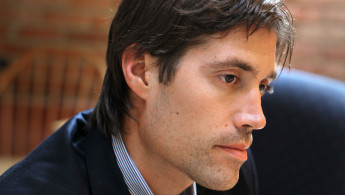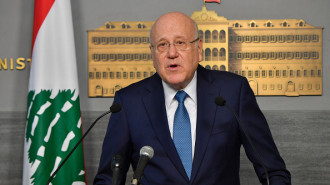Breadcrumb
NYT journalist 'threatened' family of slain IS hostage James Foley
Rukmini Callimachi is facing a barrage of allegations of unethical conduct surrounding her reporting on the Islamic State extremist group.
4 min read
Foley was brutally killed by IS extremists in August 2014 [Getty]
A New York Times reporter already embattled by allegations of journalistic misconduct now stands accused of harassing the family of James Foley just days after his death at the hands of Islamic State group extremists.
Rukmini Callimachi, a Pulitzer prize-nominated foreign correspondent for the newspaper, has faced increased scrutiny after a key source was charged with fabricating his story in a Canadian court last week.
Shehroze Chaudry, previously known by nom-de-guerre Abu Huzayfah, was the main subject of Callimachi's "Caliphate" podcast in which he told the reporter he had served as an executioner for IS in Syria.
Chaudry was charged with perpetrating a hoax on Friday. Since then, Callimachi - already accused of stealing documents from Iraq - has come under fire not only for her work on "Caliphate" but also for her wider reporting on IS in Iraq and Syria.
"She left our family with a lot of pain from her un-professionalism and lies," Michael Foley, brother of slain IS hostage James Foley, told The Daily Beast.
Foley, an American journalist, was taken hostage alongside British reporter John Cantlie by militants in Syria in 2012. He later resurfaced in IS custody and appeared in a gruesome 2014 propaganda film by the extremist group in which he was beheaded.
His brother told The Daily Beast this week that he had raised concerns about Callimachi's reporting in a letter to the NYT.
"I would also like to bring to your attention, the extreme unprofessionalism and threats Rukmini directed to a grieving family only days after Jim's horrific and public execution," Michael Foley wrote to the newspaper.
"On 2 occasions by phone, starting on Aug. 22nd, Rukmini threatened to publish a detailed torture story if I did not comply with her interview request," he said.
The Foley family also disputed several aspects of Callimachi's reporting, including claims that the journalist had been singled out for more severe torture than other captives and that the devout Catholic had converted to Islam while in captivity.
"More specifically, I was told that if I did not publically discuss my concerns with US government support, that an article detailing Jim Foley's torture would be published. She cited pressure from her editors to print the torture story if I did not comply," Michael wrote to the NYT.
"I did ultimately bow to her threats, gave her a lengthy interview and she published torture accounts anyway."
A spokesman for the newspaper told The Daily Beast that Callimachi's messages to the Foley family "were reviewed by editors and found to be appropriate".
It was not the only time questions about Callimachi's work were raised at the newspaper.
During the making of the "Caliphate" podcast, several reporters raised concerns about the veracity of Abu Huzayfah's claims. While the podcast does highlight some of those worries, Callimachi tended to refer to Abu Huzayfah as a geniune former IS member during interviews.
Senior executives at the newspaper reportedly lobbied for Callimachi to be nominated for the Pulitzer prize that year, despite opposition from editors at the paper.
In 2018, the NYT's then-Baghdad bureau chief resigned after the newspaper found she may have collaborated with the Iraqi government to keep Callimachi out of the country. Margaret Coker believed Callimachi was reckless in her reporting, The Washington Post reported at the time.
Callimachi has faced fierce criticism over her collection in Iraq of more than 15,000 documents linked to IS. The journalist took the documents out of Iraq to the United States, reportedly without the consent of Iraqi government officials.
The move created a lasting controversy. Critics, including Iraqi scholars, accuse Callimachi of violating their country's sovereignity and plundering documents that should be placed in Iraq's own archives.
Since Friday, the NYT reporter has also faced scrutiny for her alleged failure to adequately verify purported IS receipts and her purchase of a video from a Mauritanian news agency accused of ties to Al-Qaeda.
The newspaper has since formed a team to re-report Abu Huzayfah's story amid the controversy.
"I welcome the @nytimes's effort to re-examine the story," Callimachi said in a tweet on Wednesday evening.
Follow us on Facebook, Twitter and Instagram to stay connected
Rukmini Callimachi, a Pulitzer prize-nominated foreign correspondent for the newspaper, has faced increased scrutiny after a key source was charged with fabricating his story in a Canadian court last week.
Shehroze Chaudry, previously known by nom-de-guerre Abu Huzayfah, was the main subject of Callimachi's "Caliphate" podcast in which he told the reporter he had served as an executioner for IS in Syria.
Chaudry was charged with perpetrating a hoax on Friday. Since then, Callimachi - already accused of stealing documents from Iraq - has come under fire not only for her work on "Caliphate" but also for her wider reporting on IS in Iraq and Syria.
"She left our family with a lot of pain from her un-professionalism and lies," Michael Foley, brother of slain IS hostage James Foley, told The Daily Beast.
Foley, an American journalist, was taken hostage alongside British reporter John Cantlie by militants in Syria in 2012. He later resurfaced in IS custody and appeared in a gruesome 2014 propaganda film by the extremist group in which he was beheaded.
His brother told The Daily Beast this week that he had raised concerns about Callimachi's reporting in a letter to the NYT.
"I would also like to bring to your attention, the extreme unprofessionalism and threats Rukmini directed to a grieving family only days after Jim's horrific and public execution," Michael Foley wrote to the newspaper.
"On 2 occasions by phone, starting on Aug. 22nd, Rukmini threatened to publish a detailed torture story if I did not comply with her interview request," he said.
The Foley family also disputed several aspects of Callimachi's reporting, including claims that the journalist had been singled out for more severe torture than other captives and that the devout Catholic had converted to Islam while in captivity.
"More specifically, I was told that if I did not publically discuss my concerns with US government support, that an article detailing Jim Foley's torture would be published. She cited pressure from her editors to print the torture story if I did not comply," Michael wrote to the NYT.
"I did ultimately bow to her threats, gave her a lengthy interview and she published torture accounts anyway."
A spokesman for the newspaper told The Daily Beast that Callimachi's messages to the Foley family "were reviewed by editors and found to be appropriate".
It was not the only time questions about Callimachi's work were raised at the newspaper.
During the making of the "Caliphate" podcast, several reporters raised concerns about the veracity of Abu Huzayfah's claims. While the podcast does highlight some of those worries, Callimachi tended to refer to Abu Huzayfah as a geniune former IS member during interviews.
Senior executives at the newspaper reportedly lobbied for Callimachi to be nominated for the Pulitzer prize that year, despite opposition from editors at the paper.
In 2018, the NYT's then-Baghdad bureau chief resigned after the newspaper found she may have collaborated with the Iraqi government to keep Callimachi out of the country. Margaret Coker believed Callimachi was reckless in her reporting, The Washington Post reported at the time.
Callimachi has faced fierce criticism over her collection in Iraq of more than 15,000 documents linked to IS. The journalist took the documents out of Iraq to the United States, reportedly without the consent of Iraqi government officials.
The move created a lasting controversy. Critics, including Iraqi scholars, accuse Callimachi of violating their country's sovereignity and plundering documents that should be placed in Iraq's own archives.
Since Friday, the NYT reporter has also faced scrutiny for her alleged failure to adequately verify purported IS receipts and her purchase of a video from a Mauritanian news agency accused of ties to Al-Qaeda.
The newspaper has since formed a team to re-report Abu Huzayfah's story amid the controversy.
"I welcome the @nytimes's effort to re-examine the story," Callimachi said in a tweet on Wednesday evening.
Follow us on Facebook, Twitter and Instagram to stay connected






![Anthony Blinken speech [Getty] Anthony Blinken speech [Getty]](/sites/default/files/styles/image_684x385/public/media/images/6263436E-8ACD-4D3C-9055-25A7BE79DD5A.jpg?h=d1cb525d&itok=fLHmHCRG)
 Follow the Middle East's top stories in English at The New Arab on Google News
Follow the Middle East's top stories in English at The New Arab on Google News


![Paula Yacoubian was verbally attacked by Salim Aoun during a parliamentary session [Getty]](/sites/default/files/styles/image_330x185/public/1150162486.jpeg?h=b9615360&itok=xysBxMUJ)